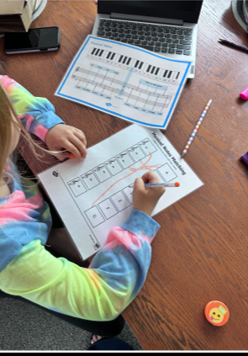The Rise Of Homeschooling
When Ron DeSantis, the American politician, made his first speech since announcing his campaign to become the Republican candidate for the US presidential election, he did so at a ‘homeschooling’ convention; I was surprised that home education had been given such prominence until I read that a whopping 4.3 million young people, and rising, are currently being homeschooled in the US. Likewise, there has been a surge in home education in the UK, the popularity of which, as you can see from the graph below, increased rapidly during the Covid-19 pandemic when schools were forced to close for several months, disrupting the education of millions of children. This huge growth in homeschooling has gone under the radar somewhat, with the number of children registering for home education in the UK rising four-fold since 2008.

Firstly, What Exactly Is ‘Homeschooling’?
‘Homeschooling’, also known as ‘home education’, ‘home ed’ or ‘elective home education’, is the practice of educating children at home, either full-time or part-time, depending on the parents’ preferences and circumstances, instead of sending them to school. It is perfectly legal in the UK and parents have the right to choose this option for their children as long as they provide a full-time education, it doesn’t have to strictly follow the National Curriculum, but has to be ‘suitable’ for the child’s age, ability and aptitude.
So Many Hurdles To Jump
Home education emerged in the 1970s with a few parents taking this unconventional route to education. There were some well-publicised interesting stories of children leaving mainstream school to travel with their parents around the globe, but it was (and still is) generally viewed as ‘quirky’. Often the children were quite isolated as there were few contemporaries and there were hardly extra-curricular activities to participate in. The general perception is that there are many obstacles to homeschooling, such as:
- Costs and resources. Homeschooling can be expensive for parents, as they have to bear the costs of materials, equipment, exams, tutors and courses. One key ingredient for home education to work is to have a dedicated parent in support, the consequences being that an income or career prospects may have to be sacrificed if one parent decides to stay at home or work part-time to homeschool their children. Moreover, homeschooling can be challenging for parents who lack the skills, knowledge or confidence to teach certain subjects or levels.
- Isolation and support. Homeschooling can be isolating for both parents and children, as the young people may miss out on the critical social interaction and support which school provides. Parents may also face criticism or misunderstanding from family members, friends or authorities who do not approve of their choice or question their ability to provide a suitable education. Furthermore, homeschooling can be difficult for parents who have to balance their roles as educators and caregivers, especially if they have multiple children or children with special needs.
- Regulation and accountability. Homeschooling is not regulated, which means that there is no official curriculum, assessment or inspection system for home-educated children. This can be seen as an advantage by some parents who value their autonomy and privacy, but it can also pose some risks for children who may not receive a quality education or adequate safeguarding. The government has proposed to introduce a register of home-educated children to monitor their welfare and progress, but this has been met with mixed reactions from the homeschooling community. The Department of Education wants local authorities and schools to identify children at risk of “missing out on education”
- Transition and integration. Homeschooling can pose some challenges for children who want to transition from this phase of education, such as applying for university or finding a job. They may have to prove their academic achievements and skills through exams, portfolios or interviews, which may not be recognised or valued by some institutions or employers. They may also have to adjust to a different culture and environment, which may require them to develop new social and emotional skills.
With these plentiful challenges to homeschooling the question is:
If There Are So Many Challenges, Then Why Is Homeschooling Becoming So Popular?
According to press reports, many parents and councils say the recent increase in homeschooling is due to “Covid anxiety”, while others cite dissatisfaction with the school system or personal reasons.
According to Faye Harrison Youth Theatre director at the Garrick Theatre in Stockport where they run a ‘home ed’ drama class: “People don’t realise that is not regimented like traditional settings, there’s freedom for the young people to decide what they want to do instead of doing subjects they don’t enjoy. For many children, school is not a safe environment.”
Home is safer, less regimented, young people decide….interesting.
What Faye is driving at is that, on a positive note, the benefits of homeschooling are numerous:
- Flexibility and individualisation. Homeschooling allows parents and children to tailor their education to their own needs, interests and goals. They can choose their own curriculum, pace, methods and resources, and adapt them as they go along. They can also schedule their learning around other commitments and activities, such as work, hobbies or travel.
- Freedom and creativity. Homeschooling gives parents and children more control over their learning environment and experiences. They can explore topics that are not covered in school or go deeper into subjects that they are passionate about. They can also use different approaches and formats to express their learning, such as blogs, podcasts, videos or portfolios.
- Innovation and collaboration. Homeschooling is not only a form of education, but also a source of innovation and collaboration. Homeschooling parents and children are constantly experimenting with new ideas, methods and tools to enhance their learning experiences. They are also networking with other homeschoolers and organisations to share their knowledge, skills and resources, and to create opportunities for learning and socialising.
- Relationships and values. Homeschooling can strengthen the bond between parents and children, as they spend more time together and share their learning journeys. It can also foster a sense of responsibility and independence in children, as they learn to manage their own time and tasks. Moreover, homeschooling can allow parents to instil their own values and beliefs in their children, without being influenced by external factors such as peer pressure, conflicting religions or school policies.
- Well-being and happiness. Homeschooling can enhance the physical and mental health of children, as they can avoid some of the stresses and pressures that come with school life, such as bullying, exams, homework or competition. They can also have more opportunities to exercise, play, relax and socialise with people of different ages and backgrounds.
- Diversity and inclusion. Homeschooling can be seen as a way of promoting diversity and inclusion, as it allows families to celebrate their identities, cultures and values, and to challenge stereotypes and discrimination. However, homeschooling can also be seen as a way of reinforcing segregation and exclusion, as it may create gaps and barriers between different groups of society.
- Covid-19 and online learning. The Covid-19 pandemic has had a significant impact on the education system and the homeschooling movement in the UK. Many parents have opted to homeschool their children due to health concerns, dissatisfaction with the school’s response to the crisis, or a positive experience of home learning during the lockdowns. Moreover, the pandemic has accelerated the development and adoption of online learning platforms and resources, which have made homeschooling more accessible and affordable for many families.
It’s Alright Talking About It But How Are People Actually Doing It in Practice?
In this section we outline an excellent real-life example of how a family is doing home education in practice.
In this particular family setting in Rochdale, the parents were keen to withdraw their eldest daughter after she was experiencing bullying at school. Once they had set up a framework and designed a timetable for their daughter to be homeschooled, they felt that it would be beneficial overall for her two siblings to enter into the same timetable structure and also be educated at home.
Now, they would like to share it with everyone who is thinking about homeschooling their children.
The Typical Week At Home
During a typical week in the educational journey, Summer, Tristan and April stick to a structured timetable (see below); the main focus in the mornings is on the educational backbones of English, Maths and Science; and then the afternoons are for a range of different chosen subjects, such as Spanish, History, Geography etc.
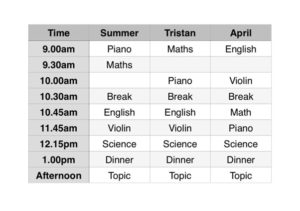
The three children have access to educational apps and websites to support their learning, namely: IXL, TT rockstars, YouTube, Twinkl, White Rose Maths, Music Gurus, Note Blaster, Duolingo, Kloodle, Set the Clock, Google Earth, BBC Bitesize and Teach My Monster To Read. Another big area of focus is learning through gaming and coding, where children can develop problem-solving skills by playing games such as Roadblock, Minecraft.
Although, in this case, the family adheres to timetables and lesson objectives, many home education scenarios do not use traditional curriculum methods, but focus on learning though daily discussions around ordinary everyday practical experiences, like handling change in shops.
With Lashings Of Extra-Curricular
Extra-curricular activities of choice are fitted in around the ‘school day’ and at weekends. So, for example, this is April’s ‘extra-curricular’ timetable:
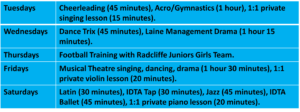
The three children all access lots of opportunities to socialise in the evenings and weekends during the classes that they attend.
How Does Kloodle Fit In?
 Homeschooling pupils, like Summer, Tristan and April, and their parents can use multiple resources available to them to set activities and challenges. This promotes rich experience and skills’ development and enrichment can be captured by being recorded on Kloodle during or after each lesson or activity. Learners can do this by uploading photos, videos, documents and blogs about the exercise to their Kloodle profile on their phone or PC, tagging in the skills they are honing as part of the task.
Homeschooling pupils, like Summer, Tristan and April, and their parents can use multiple resources available to them to set activities and challenges. This promotes rich experience and skills’ development and enrichment can be captured by being recorded on Kloodle during or after each lesson or activity. Learners can do this by uploading photos, videos, documents and blogs about the exercise to their Kloodle profile on their phone or PC, tagging in the skills they are honing as part of the task.
The siblings make their own posts but, generally, this can depend on ability and age and so parents can also post on children’s behalf. The Kloodle software is very user-friendly and assistive, helping all levels of learners with these activities.
Here are examples of Summer’s posts for Drama and English. Wow!
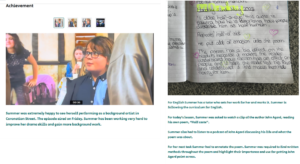
Reflections
Reflection is a very powerful component of the process as young people think more deeply about identifying skills and then how to develop them, so personal reflections can be added to Kloodle after activities, when students consider how their skills have evolved.
And here are some real-life excellent examples of how April and her brother, Tristan, have posted work, certificates and reflections on Kloodle about work on Maths, English or other subjects, extra-curricular activities like drama and music, and even skills relating to daily life, like making your own breakfast!
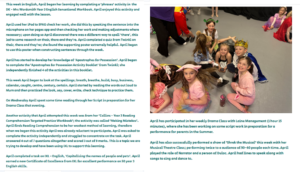
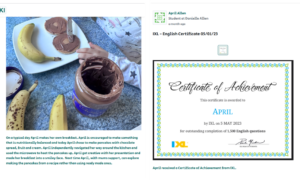
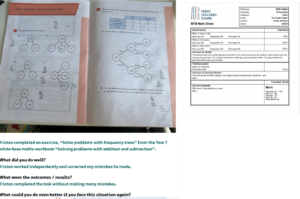
Shareable Feed
Parents can quickly and easily highlight the evidence they want to present to local authorities as a report and create a shareable feed, which otherwise would take tens of hours to collate.
The feedback from Rochdale Council was as follows: “It was a joy to see Summer, Tristan and April through the Kloodle platform performing their dance classes and music sessions. It’s a great way to see the progress made and review subjects over time. Lots of variety in age appropriate work completed. Keep up the fantastic work you are all doing a great job.”
The Kloodle Skills’ Wheel
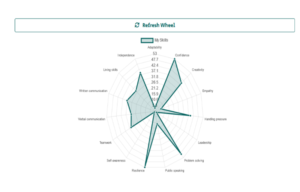 Each individual learner has a skills’ wheel on their Kloodle profile, which illustrates the growth in skills’ development. The family has tailored their own skills’ framework of 15 different values. The one illustrated below is Tristan’s. By completing tasks, the students can identify how their aptitudes can grow their individual skills wheel. That feels good!
Each individual learner has a skills’ wheel on their Kloodle profile, which illustrates the growth in skills’ development. The family has tailored their own skills’ framework of 15 different values. The one illustrated below is Tristan’s. By completing tasks, the students can identify how their aptitudes can grow their individual skills wheel. That feels good!
This process builds self-awareness and confidence as the most important aspect is that the skills are transferable. You can notice that Tristan is developing his ‘Teamwork’ even though he is being schooled at home! This is through all the extra-curricular activities he is doing with other children. The Kloodle journey doesn’t just end when the learners finish being homeschooled; ultimately, they can complete CV writing on Kloodle and keep their profiles for life!
Kloodle Helps With The Tailored Character And Skills’ Development
Historically, homeschooling was seen as a niche type of education with limited options. However, the Covid pandemic presented an opportunity for many families to try educating their children at home, integrated into their lifestyle. This has resulted in a huge growth in homeschooling, as parents are voluntarily taking their children out of mainstream ‘exam factory’ education to experience a more varied and tailored approach, which can develop close family relationships and build key life skills. Kloodle facilitates the additional depth, awareness and richness in learning, which allows customisation and real emotional understanding of character and skills through reflection, and avoids the ‘cookie cutter’ and superficial knowledge-based educational route.

